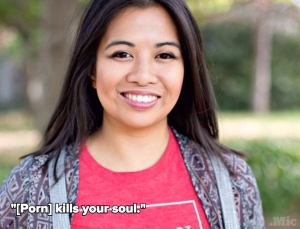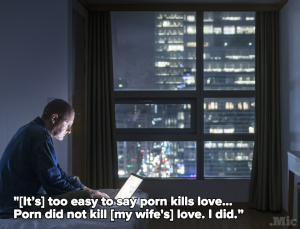Meet the Young People Spearheading a Huge Anti-Porn Movement, Porn Kills Love
Chiara Marie was 10 years old the first time she saw porn. As she tells it, “one view forever changed the course of my life.”
When she became an adult, she started watching porn constantly in secret, often in lieu of her interacting with her partners. When she did have sex, she constantly assessed her interactions against what she saw in porn. Watching porn, she said, “affected my relationships with men.”
Today, Chiara is a lifestyle blogger, letterer and digital marketer in her late 20s. She’s also a recovering porn addict, an observant Christian living in the Dallas/Fort Worth area and a public supporter of #PornKillsLove (PKL), a social media-based anti-porn campaign organized by anti-porn activist group Fight the New Drug.
Chiara agrees with Porn Kills Love’s central premise — There is no love in porn. “To me love is raw and real, you search and seek it and when you find it you hold on. It brings you joy, it makes you conquer. It makes man achieve great things,” Chiara told Mic. “It’s a word that people have even a hard time even saying to each other. There is buildup and anticipation and hope.”
But with porn, according to Chiara, there is no love.
Love is “edited out. It’s acted. It’s lies. It’s fantasies that we can get deeper in with no end result except for just satisfaction of one’s self. It’s selfish,” she said.
Porn, Chiara says, “kills your soul.”
(pictured: Chiara Marie, via Twitter/Mic)
Chiara’s views are shared by the other fighters in the Salt Lake City-based group Fight the New Drug. Founded in 2008, FTND is a self-described “group of passionate and innovative problem-solvers who want to make a difference in the world.” The nonprofit organization’s stated mission is to “raise awareness on the harmful effects of pornography through creative mediums,” one of which is #PornKillsLove.
With more than 21,000 followers on Twitter and well over 1.1 million likes on Facebook, FTND appears to have a fairly substantial youth following. Its website, where it sells snappy red T-shirts and other merch, is slick and hyper-modern. (Despite weeks of sending requests for comment, no one from Fight the New Drug would comment on this story.)
Chiara is a quintessential “Fighter.” She stumbled on Fight the New Drug about three or four years ago, after she came to terms with her own porn addiction. And like many social media activists, she doesn’t take to the streets to the bullhorn to express her support for the cause. “I support them from a social media standpoint and donate when I can,” she said.
Being a Street Team Fighter makes you a foot soldier for the cause. Repping the movement has never looked so good. pic.twitter.com/A8CNUm91Wm
— FIGHTERS (@FightTheNewDrug) December 10, 2015
While there are many anti-porn organizations out there, such as One Million Men and Stop Porn Culture, FTND is unique in that it takes a grassroots approach. It relies on members of its street team, called “Fighters,” to wear conversation-starting T-shirts and spread the word via social media. Recently, FTND ran an 80-sign billboard campaign in the San Francisco Bay area proclaiming “Porn Kills Love. Fight For Love.”
There are other aspects of Fight the New Drug that also differentiate it from other anti-porn groups — at least, on the surface. The organization does its best to mask any religious influence or affiliation. (The founders, however, are devout members of the LDS church.) Yet it bears many similarities to traditional anti-porn organizations as well. From its messaging that “real men don’t watch porn” and its “love takes two” slogan, FTND’s marketing is clearly heteronomative, relying heavily on rhetoric related to conventional and often antiquated forms of sexual expression.
Furthermore, although FTND claims its anti-porn messaging is based on scientific “facts” about porn addiction, existing research surrounding porn addiction is neither particularly scientific nor rigorous. In fact, science has shown that physical porn addiction, something akin to drug addiction, might not actually be a thing.
We are Fighters. We are rebels. We are the wake up call. #PornKillsLove pic.twitter.com/6ORm0ugUTc
— FIGHTERS (@FightTheNewDrug) December 1, 2015
In a 2013 study, for example, researchers from the University of New Mexico, UCLA, and Idaho State University used EEG testing to examine the effect viewing erotica has on the brains of porn addicts. While researchers predicted that so-called porn addicts would show brain patterns consistent with that of drug addicts, instead they experienced increased electrical brain responses to erotic imagery — just like the brains of “normal” people. A study published in June in the journal Biology and Psychology reaffirmed these findings, suggesting that while people might very well struggle to balance their porn-watching habits with their daily lives, porn “addiction” might have little neurological basis.
But while numerous studies have poked holes in the concept behind porn addiction, PKL and FTND still have a great deal of support on social media. While some of this support clearly comes from people with evangelical inclinations, their messaging also resonates with people active in significant secular anti-porn and masturbation movements.
With almost 175,000 (no) Fapstronauts (members of the anti-masturbation r/nofap subreddit) on Reddit alone, there’s clearly a backlash to porn going on in circles that might not necessarily have religious roots. In our puritanical society, the stigma and shame associated with viewing porn probably plays a role in the anti-porn backlash. (In fact, a 2014 study determined that people were more likely to self-identify as porn addictions if they came from religious backgrounds, which made them more likely to view porn and masturbation as evil or impure.)
In a Reddit thread about issues related to porn and addiction shaming, Redditor u/dandausa, who’s active on the r/PornFree and r/NoFapChristians subreddits, said that while he’s skeptical of FTND’s intentions in framing porn use as an addiction (he referred to the group as “a t-shirt manufacturer who’s trying to make a few bucks off of [others’] addictions”), it’s true that watching too much can cause legitimate issues in one’s life.
“That’s why PKL isn’t necessarily bad,” u/dandausa wrote in a thread started by Mic. “They’re trying to create a culture that no longer shames the addict… creating a place for the addict to come where there is connection and no longer isolating them.”
(pictured: image via Mic)
The idea that porn is addictive and, as a result, can literally kill love is scientifically unfounded. But that doesn’t mean there isn’t a reason to keep the idea going.
According to a Psychology Today op-ed by clinical psychologist David Ley, many people have much to gain financially from the concept of porn addiction – people who sell treatments, people who believe that sex and porn should be feared or controlled and people who believe that they are helping others by spreading the word about the dangers of porn addiction.
Perhaps most importantly, porn addiction rhetoric helps the addict by providing a sound peg on which they can hang their problems.
Some people ultimately realize that porn is not the enemy and that their problems lie deep within themselves. As r/PornFree Redditor u/DukeStamina told Mic: “I over-consumed. I would bury myself in [porn] for countless hours per day. I would lie to my wife, using [porn] every chance she was not around. [It’s] too easy to say porn kills love… Porn did not kill her love. I did.”
That said, there are clearly people who feel the rhetoric of porn addiction actually helps. Chiara, for instance, has been porn-free for over two years now and doesn’t let occasional slips derail her commitment. She is celibate and a reborn virgin and is also active in her church’s addictions ministry. Most importantly, she seems really happy.
“I have a personal relationship with God now, which I didn’t before,” she said. “Once I released that lifestyle to Him, to the universe (whatever one wants to call it), many doors opened for me. I was no longer tied down.”
And as Chiara points out, PKL helped her realize what really mattered in her own life. “We are all simply just passing through this world. We are not guaranteed a certain timeline here,” she said. “What do I want to achieve with my time here? Real authentic love.”
Though it’s easy to dismiss PKL on one hand, to ignore this dimension is just as irresponsible as touting pseudo-science about addiction.
#RelationshipGoals pic.twitter.com/PogWR4FySq
— FIGHTERS (@FightTheNewDrug) December 17, 2015
Reprinted from Mic.com (12/22/15)
And ICYMI, you can read all my work featured on Mic dot com right –> here
* * *
Got a sociology question? Need some social justice informed life advice? Contact Dr. Chauntelle right here.
Get Exposure: A Sociologist Explores Sex, Society, and Adult Entertainment on Amazon and CT.com

